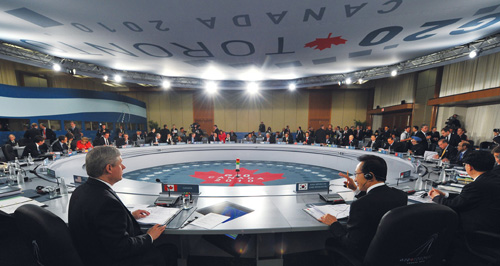President Lee¡¯s Assurance to G-20 Summit
Korea¡¯s support for developing countries to achieve sustainable long-term growth

As chair of this year¡¯s meeting of Group of 20 leaders, President Lee Myung-bak has made it clear that he will focus on addressing the challenges that developing countries face in achieving sustainable long-term growth. Two big issues will be placed high on the agenda when Seoul hosts the next G-20 summit in November ¡ª closing the growth gap between advanced and developing economies and establishing a global financial safety net.
In other words, Korea will strive to strengthen global partnership programs for achieving balanced growth, while building up a system to protect emerging economies from the volatility of international fund flows.
To make the discussions successful, however, he must address differences of views among members on how to attain these goals.
Even last year, pessimism prevailed on the possibility of an economic slump that would push the world into another Great Depression. Fortunately, the actual outcome has been better than those worst-case scenarios.
Ironically, the better-than-expected recovery of the world economy presents greater challenges for Korea¡¯s efforts to coordinate policies.
While the crisis was deepening, the necessity of effective policy coordination was easily impressed on everyone. As the crisis abates, however, countries tend to act for their own interests. In addition, there will be legitimate differences of views on the appropriate pace and sequencing of exit strategies and the sustainable levels of public debt amid the European debt crisis. Such differences can make reaching an agreement more challenging at the Seoul summit. ¡°Although the financial crisis brought the world together and forged an effective coordinated crisis response, we need to translate the momentum we have generated toward establishing a forum that can play a genuine global leadership role for longer term issues,¡± President Lee said in a contributing article to the Munk School of Global Affairs at the University of Toronto.
The world economy has stabilized through the concerted action of governments, but private sector investment and job creation are still far from robust. For an enduring recovery, the revitalized growth of private investment must follow. Priority should be given to job creation and investment by the private sector.
In this context, one of the toughest jobs ahead of the Seoul summit will be to help the conflicting sides find common ground on how to restructure the financial governance system and boost private investment. With countries set to adopt exit strategies, financial reform will be crucial for the world to fully overcome the crisis and address economic imbalances between developed and poorer nations.
One task for the G-20 is to follow through on the initiatives and agreements made in Toronto and other previous summits on reforming financial regulations, reforming international financial institutions and implementing a framework for strong, sustainable and balanced growth. The G-20 leaders have dealt with the issues of reforming bank capital regulation, the problem of institutions that are too big to fail and burden-sharing within the financial sector.
As the chair of the forum, President Lee is tasked to coordinate efforts in these directions so that the overhaul of the global financial regulatory system rests on firm conceptual foundations and can be implemented effectively It was unthinkable even a few years ago that a Korean President would gain as much global attention as President Lee Myung-bak enjoys these days. Since the country won the bid to host the G-20 Summit last year, it has successfully positioned itself as an arbitrator between the United States representing the old regime and China seeking a new world order.
President Lee has made it clear that he will mediate between the two superpowers to address their conflicting views and, for his part, increase Korea¡¯s stake in deciding on the future course of the global economy.
His goal is simple: clearing the fallout of the financial crisis to bring the world economy back on track based on the collective wisdom of the countries that are at odds over how to do so. Lee said he will put the creation of a global financial safety net high on the agenda during the G-20 Seoul Summit in November, which on the flip side means a challenge to the established financial order being maintained by the International Monetary Fund and the World Bank. nw
A scene of the G-20 Summit in Toronto, Canada, held from June 25-26. President Lee Myung-bak of Korea is seen second from right.
3Fl, 292-47, Shindang 6-dong, Chung-gu, Seoul, Korea 100-456
Tel : 82-2-2235-6114 / Fax : 82-2-2235-0799